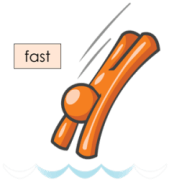English Adverbs

Click Here for Step-by-Step Rules, Stories and Exercises to Practice All English Tenses
Adverbs usually answer the following questions:
Where? Home. ("I went home.")When? Yesterday. ("We met yesterday.")
How? Slowly. ("The turtle moves slowly.")
How often? Sometimes. ("Sometimes it stops responding.")
How long? Temporarily. ("She is staying with us temporarily.")
How likely? Surely. ("Our team will surely win!")
To what degree? Very. ("She was very pleased.")
An adverb can describe a verb:
She runs quickly.
An adverb can describe an adjective:
She is so beautiful.
An adverb can describe another adverb:
She smokes very rarely.
An adverb can describe an entire sentence:
Naturally, you don't have to come.
The word "adverb" comes from the Latin ad- (in addition) and verbum (word).
In many cases (but not always!) adverbs have the following form:
Adjective + "-ly"
Examples:
Quick + ly = quickly
Strange + ly = strangely
Dead + ly = deadly
Sudden + ly = suddenly
Clever + ly = cleverly
Brave + ly = bravely
Real + ly = really
When an adjective ends with "y" replace the "y" with an "i":
Heavy + ly = heavi + ly = heavily
Happy + ly = happi + ly = happily
When the adjective ends with an "e" drop the "e":
True + ly = tru + ly = truly
However, there are many adverbs that do not end in "-ly":
Fast, very, hard, home, just, too, well, never, sometimes, and so forth.
We can divide English adverbs into several categories:
Adverbs
of degree, adverbs of
manner, adverbs of place,
adverbs of time, adverbs of frequency, adverbs of duration,
adverbs of probability, comparative adverbs and superlative adverbs.
Adverbs of degree
Adverbs of degree show us the strength or degree of the action or
state. They answer the following questions:
How much? To what degree?
Examples:
Very, highly, totally, perfectly, partially, almost.
He answered perfectly.


Example sentences:
- He is very concerned about you.
- You are totally right.
- We almost made it to the train.
Adverbs of manner
Adverbs of manner show us the way the action is done. They answer the
following question:How?
Examples:
Well, badly, nicely, slowly, loudly, quietly, happily, sadly, secretly, weakly.
They run happily.


Example sentences:
- He handled the situation well.
- She listened secretly to their conversation.
- The children ran happily to their father.
Adverbs of place
Adverbs of place show us the location of the action or state. They
answer the following question:Where?
Examples:
Home, here, there, outside, inside, away, around, anywhere, abroad, up, down, out.
He is home.


Example sentences:
- We are here.
- He went home.
- We found him outside.
- She looked up.
Adverbs of time
Adverbs of time show us the time of the action or state. They answer
the following question:When?
Examples:
Now, soon, later, yesterday, tomorrow, early, before, lately, recently.
They are
having dinner now.


Example sentence:
- Let's talk now.
- I will do it later.
- He promised to write back soon.
- What are you doing tomorrow?
- We haven't met before.
Adverbs of
frequency
Adverbs of frequency show us the frequency of the action or state. They
answer the following question:How often?
Examples:
Always, never, sometimes, often, rarely, usually, occasionally.
I will never
do that!

Example
sentences:
- I always brush my teeth after a meal.
- We often meet and chat.
- He is usually here on time.
Adverbs of
duration
Adverbs of duration show us the length of the action or state.They answer the following question:
For how long?
Examples:
Forever, constantly, temporarily, briefly.
He will forever be her little boy.

- He is working there temporarily.
- We spoke briefly.
- I will be forever grateful.
Adverbs of
probability
Adverbs of probability show us the chances for the action or state to
happen. They answer the following question:How likely?
Examples:
Certainly, maybe, probably, possibly, surely.
He is probably
in trouble.


Example sentences:
- She will certainly forget about it.
- Maybe we'll come after all.
- It will probably not work.
- Surely you are not serious!
Comparative
adverbs
"Comparative" means "comparing something to something else."Comparative adverbs show us which action or state is better, worse, stronger, weaker, and so forth.
Examples:
More, less, better, worse, faster, slower, farther, closer.
She writes faster
than most people.


Example sentences:
- Maggie works out more seriously than Donna.
- She eats less than her friends.
- You are better than this.
- We couldn't go slower even if we wanted to.
- Let's get closer.
Superlative
adverbs
"Superlative" means "of the highest degree."Superlative adverbs show us which action or state is the best, the strongest, and so forth.
Examples:
Best, most, least, worst, strongest, fastest, slowest.
They like
each other best.


Example sentences:
- He knows best.
- It was the most boring experience.
- He shouted the loudest, so he won.
- He ran the slowest, so he lost.
Read also:
Illustrated Worksheet on Adverbs
Get Updates, Special Offers, and English Resources
Download your FREE GIFT (the first two chapters of
English Short Stories Book and Workbook)
as soon as you join!

By submitting your email, you consent to receiving updates and newsletters from us and to the sharing of your personal data with third parties for the purposes of sending you communications. We will not spam you. You can unsubscribe at any time. For more information, please see our privacy policy.
Return from English Adverbs to English Parts of Speech
Return from English Adverbs to Learn to Write in English








